ASTANA – Kazakhstan co-chairs the International Conference on Nuclear Security: Shaping the Future (ICONS 2024) in Vienna on May 20-24 with Australia. Kazakhstan’s Vice Minister of Energy Sungat Yessimkhanov addressed the opening session on May 20 with co-president and Assistant Minister for Foreign Affairs of Australia Tim Watts and the International Atomic Energy Agency (IAEA) Director General Rafael Mariano Grossi.
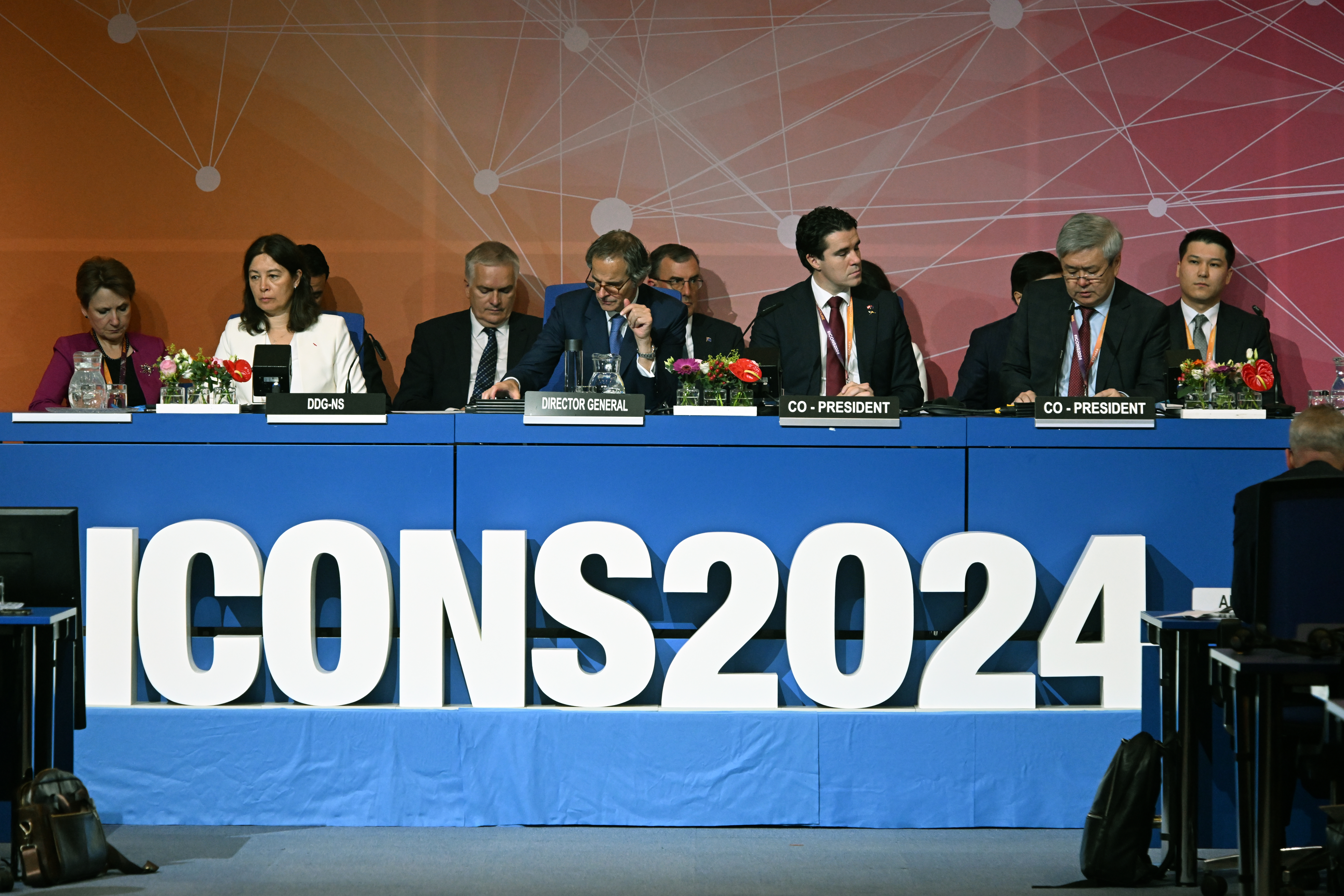
From L to R: Head of IAEA Nuclear Safety and Security Department Lydie Evrard, IAEA Director General Rafael Mariano Grossi, Assistant Minister for Foreign Affairs of Australia Tim Watts and Vice-Minister of Energy of Kazakhstan Sungat Yessimkhanov at the opening of the ministerial segment of ICONS on May 20 in Vienna. Photo credit: Dean Calma/ IAEA
The forum, organized under the auspices of the IAEA, convenes over 2,000 delegates, including ministers, policymakers, and experts from more than 130 countries, to discuss nuclear security, exchange the latest information, and share best practices.
The conference, which occurs every four years and is considered a major nuclear security event, aims to explore how countries can strengthen global nuclear security and address rising challenges. The agenda topics range from nuclear policy and regulation to technology and infrastructure for prevention, detection, and response to the nexus between nuclear security and nuclear safety.
Kazakh Vice Minister Sungat Yessimkhanov said the conference comes at a critical time for global nuclear security.
“The international community today faces many different challenges. At the same time, products of artificial intelligence (AI) and advanced computing technologies offer new opportunities to strengthen national nuclear security regimes,” said the Kazakh official.
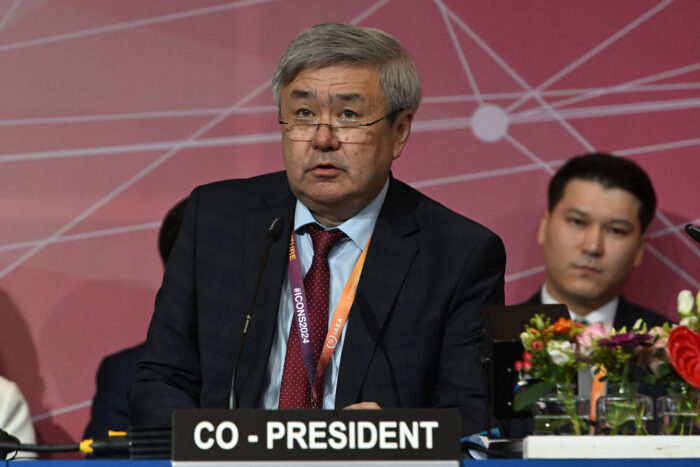
Sungat Yessimkhanov. Photo credit: Dean Calma/ IAEA
Yessimkhanov emphasized as new technologies continue to evolve, the leaders need to adapt nuclear security regimes to “mitigate potential risks and reap the benefits of the technologies.”
He reaffirmed Kazakhstan’s enduring commitment to global efforts in this area.
“Kazakhstan is a party to the main legal instruments in nuclear security and we call upon member states to adhere to them. We also commend the IAEA’s role in preventing and responding to acts and threats of nuclear terrorism, developing nuclear security requirements and guidelines, and providing advisory services and capacity building to member states,” said Yessimkhanov.
He recalled Kazakhstan’s momentous decision to voluntarily renounce its nuclear arsenal in 1991, which it inherited from the Soviet Union.
“The concept of disarmament, non-proliferation, and peaceful use of nuclear energy has become an essential part of Kazakhstan’s national identity. Ensuring the nuclear security of the former Semipalatinsk nuclear site was the first major challenge for newly independent Kazakhstan,” he said.
The Kazakh official further detailed Kazakhstan’s efforts to develop alternative energy sources. “Kazakhstan made a bold leap forward by adopting a strategy on achieving carbon neutrality by 2060. Under this strategy, we pay special attention to the development of nuclear and hydrogen energy, renewable energy, and converting coal-fueled facilities to gas,” he said.
Among Kazakhstan’s contributions to the non-proliferation regime and sustainable development of nuclear energy is hosting an IAEA low-enriched uranium bank at the Ulba plant in Ust-Kamenogorsk in the eastern part of the country.
“We continue to implement research reactor conversion projects aimed at converting highly enriched uranium fuel to low enriched uranium fuel, thereby helping to reduce the risk of nuclear proliferation. Just last year, we successfully completed the conversion of another research reactor at the National Nuclear Center [in Kurchatov], which is now fully operating on low-enriched fuel,” said the vice minister.
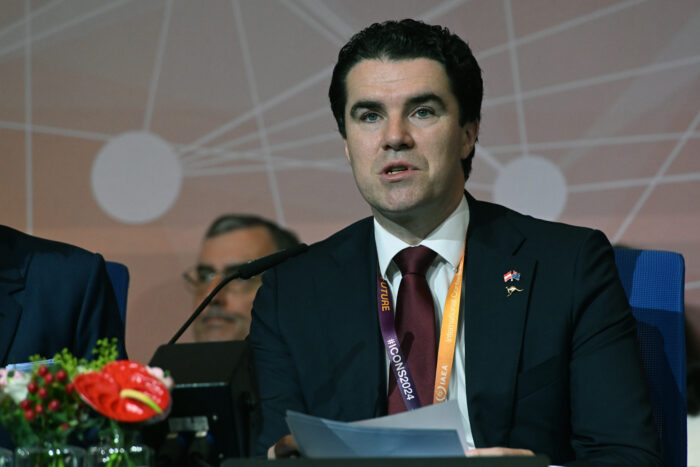
Tim Watts. Photo credit: Dean Calma/ IAEA
Tim Watts said that over the past four years, global tensions have evolved into “new, more complex conflict environments with newer weapons and diverse sophisticated actors.”
“In parallel, there has been a remarkable growth in the use of nuclear technology, in recognition of its benefits to humankind. In this context, the risk that malign actors will access and misuse nuclear materials has increased. A strong and sustainable nuclear security system has never been more imperative,” said Watts.
According to him, nuclear science and technology can positively and considerably affect people’s lives.
“As a world-leading producer of nuclear medicines to diagnose and treat cancer and other diseases, Australia recognizes the important role of nuclear security in facilitating the peaceful uses of the atom in building public confidence in the use of nuclear technology, and in ensuring the protection of our communities,” he said.
He urged the gathering to consider and realize the existing nuclear security commitments and make the best of emerging technologies.
“Take AI, for example. We need to shape relevant AI rules and norms to protect nuclear and related facilities from malicious cyber activity that could compromise nuclear security. A global effort is required to manage these complex and evolving challenges. We need your expertise,” said Watts, highlighting the importance of diversity, equity and inclusion in establishing and maintaining peace and security.
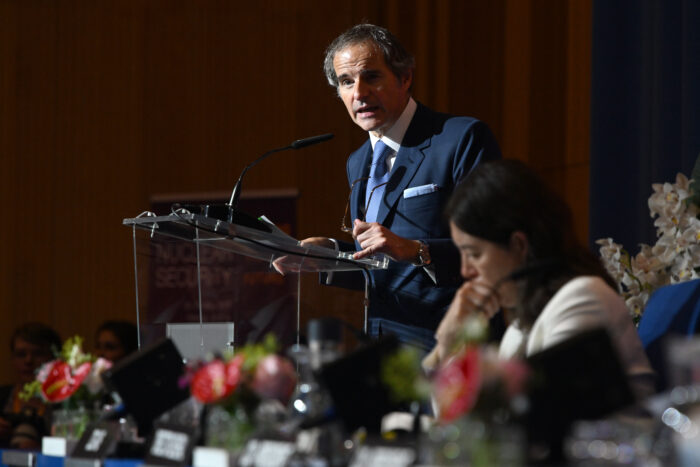
IAEA Director General addresses the opening session. Photo credit: Dean Calma/ IAEA
Addressing the opening session, IAEA Director General Rafael Mariano Grossi stressed significant technological advancements since the last conference in 2020. He also said it is imperative to consider how the world can address the risks posed by these advancements on nuclear security, including those stemming from artificial intelligence and unmanned vehicles.
“Artificial intelligence and unmanned vehicles pose both a threat to nuclear security and offer new tools with which to enhance it. In the nuclear field itself, small modular reactors promise new opportunities for applications such as desalination and power brought to remote communities via barge, but also require us to consider new security elements,” he said.
At the same time, nuclear science and technology “has come on in leaps and bounds,” he said.
“The use of life-saving and life-affirming applications of nuclear science and technology is growing, from cancer patients gaining access to radiotherapy to farmers benefiting from new crop varieties developed with the help of irradiation. IAEA initiative such as Rays of Hope: Cancer Care for All; Nutec Plastics; Zoonotic Disease Integrated Action (ZODIAC); and Atoms4Food are key vehicles facilitating wider access,” said Rossi.
While nuclear security is the national responsibility of individual states, the participants agreed that strong collaboration between countries plays a critical role.
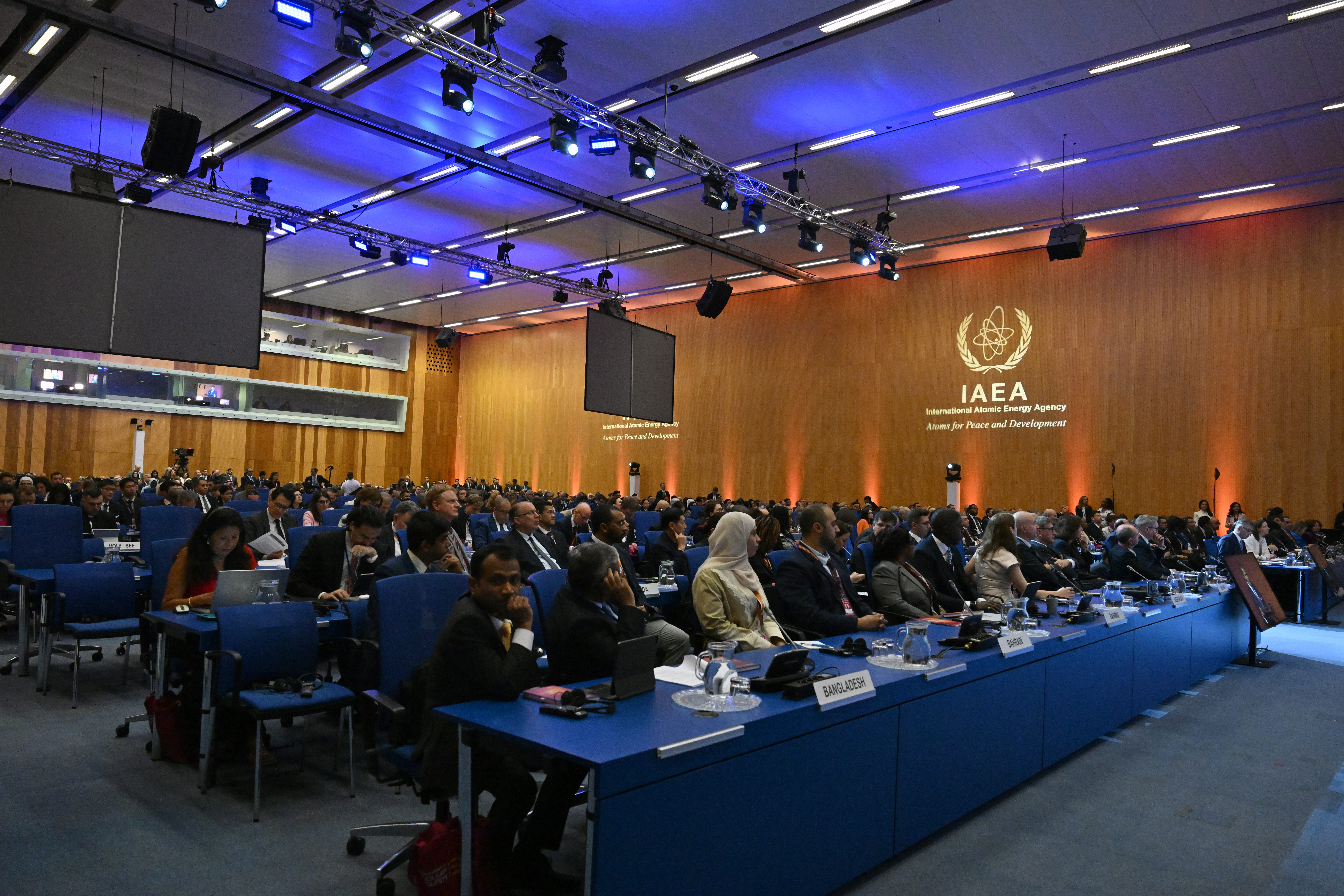
The participants at ICONS 2024 opening session. Photo credit: Dean Calma/IAEA
“At ICONS 2024, we are – as the name of the conference indicates – ‘shaping the future,’ not only of nuclear security but of the world our children will inherit. That is because nuclear security is about more than preventing nuclear terrorism. It is an enabler to providing, through nuclear science and technology, clean energy, cutting-edge medicine, nutritious food and hope for a better tomorrow,” noted Rossi.
Kicking off with a two-day ministerial segment that included national statements, interactive sessions, and high-level policy discussions for ministers, the conference also features a four-day scientific and technical program with policy discussions and technical sessions. The scientific and technical segment includes 52 technical sessions and four technical plenary sessions.
According to the 2024 Factsheet for the IAEA Incident and Trafficking Database, 31 states reported 168 incidents in 2023. Since 1993, there have been 4,243 reported incidents involving illegal or unauthorized activities with nuclear and other radioactive materials.
